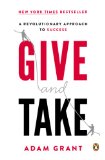Summary | Excerpt | Reading Guide | Reviews | Beyond the Book | Read-Alikes | Genres & Themes | Author Bio

A Revolutionary Approach to Success
by Adam M. GrantThis article relates to Give and Take
In Give and Take, Adam Grant takes pains to demonstrate that many cold-hearted business transactions actually have a human side – that there is more at stake in contract negotiations, say, than the bottom line. He emphasizes the complexity of the give-and-take in business relationships by pointing out that such negotiations are "not a zero-sum game." Contract negotiations are not a zero-sum game; networking is not a zero-sum game. And so on.
What exactly is a zero-sum game?
Two men are facing each other across a table upon which are placed two goblets full of wine. One goblet contains a deadly poison. Both men must drink, and one will die. One of the men will live, and the price of his life is the death of the other man.
Unless of course one man has secretly built up an immunity to the poison (like Westley in The Princess Bride), or secreted a pouch in his mouth to contain the wine so he doesn't have to swallow it, or entered into some other such far-fetched scheme to avoid the inevitable…But these are literary embellishments, and they break the rules of what is essentially a mathematical concept. In a zero-sum game, for every winner there must be a loser.
The concept of zero-sum comes from game theory. In a zero-sum game, the total of all wins and losses is zero. Poker is a zero-sum game – all the money on the table comes out of the players' pockets, and the winnings you go home with at the end of the night used to belong to someone else. Tennis is another zero-sum game, as is chess. It's tempting to complicate matters by reading in to the strategy behind the game – even if someone loses, you could say that their moves were elegant or that they served particularly well. But this is the literary mind embellishing again. In mathematical terms, there is only one winner and only one loser.
In economics, zero-sum refers to certain money exchanges and not others. Futures trading is a zero-sum game. There were only so many pork bellies to go around, back in the day when we still traded pork belly futures. If I took them from you, it was your loss. The stock market, on the other hand, is not a zero-sum game. The stock market can grow new wealth by bringing in money from outside itself, and in this way can generate more money for everyone. Ditto the reverse.
Business exchanges are more muddy, as Adam Grant points out. You might think of a contract negotiation as zero sum – either you get the money or your boss gets to keep it – but in fact there are many other factors. Money is not the only rubric in business exchanges, or rather, there are intangible factors involved that will lead to a gain or loss of money over time. If your boss pays you more and you leave the contract negotiation happy and motivated, you will likely earn more money for him down the road.
The concept of a zero-sum game begins to fall apart when entering the realm of human relationships. In marriage, for instance, there may be individual contests that read as zero-sum games (if the husband does all the dishes, say, and the wife gets off scott free), but in the long run, there is no clear winner. As a cultural metaphor, however, zero-sum games have rich potential. It's commonplace to point out, as Adam Grant does, what interactions are not zero-sum games. Getting teens to pay attention to its services is not a zero-sum game, says Facebook. Controlling the Internet is not a zero-sum game, says Google's CEO. There's plenty for everyone to have a piece of the pie. We could bake another pie! Let's agree not to drink the poisoned goblets – let's both pour ours on the ground. It's a win-win situation.
Filed under Cultural Curiosities
![]() This "beyond the book article" relates to Give and Take. It originally ran in July 2013 and has been updated for the
March 2014 paperback edition.
Go to magazine.
This "beyond the book article" relates to Give and Take. It originally ran in July 2013 and has been updated for the
March 2014 paperback edition.
Go to magazine.




The low brow and the high brow
Click Here to find out who said this, as well as discovering other famous literary quotes!
Your guide toexceptional books
BookBrowse seeks out and recommends the best in contemporary fiction and nonfiction—books that not only engage and entertain but also deepen our understanding of ourselves and the world around us.